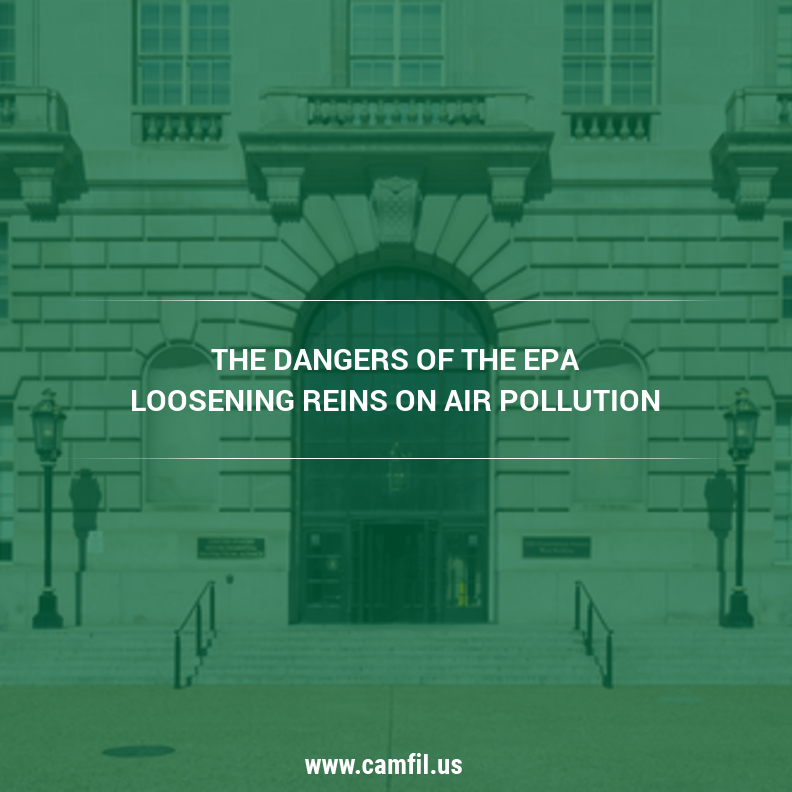The EPA is reconsidering a rule against toxic emissions from power plants. Learn how this could impact indoor air quality and drive demand for home air filters.
Commercial Air Filtration News – While many in the Republican Party have expressed skepticism over the science of anthropogenic climate change, which is climate change resulting from human activities, they have been less willing to deny the dangers of manmade air pollution. Most will agree that breathing in smog and soot is bad for human health and that home air filters are an important addition to homes or buildings, especially if they’re located in areas with historically bad air quality.
“According to the World Health Organization (WHO), air pollution causes two million premature deaths every year worldwide,” said Camfil USA’s Charlie Seyffer, Manager of Marketing & Technical Materials for commercial air filters and 37-year ASHRAE member and active committee participant. “Long-term exposure to ultrafine particles can induce respiratory and cardiovascular diseases, increasing the mortality rates for people living in highly polluted urban areas.”
While air pollution is considered bad for everyone, things are changing in the federal government, which has taken a new position concerning the impact of particulate matter (PM) on public health.
EPA Policy Shift Could Compromise Outdoor and Indoor Air Quality
Over the last two years, theories that were once pushed only by lobbyists in the tobacco industry and far-right conspiracy theorists have made their way into the offices of the U.S. Environmental Protection Agency (EPA). From once being ridiculed for being unscientific, positions such as denial of anthropogenic climate change or that there is an “acceptable” level of air pollution are now behind a number of proposed EPA policy changes, which could have disastrous consequences on outdoor and indoor air quality.
In October of this past year, the EPA moved to scrap two external panels composed of experts whose roles were to advise the agency on how to limit toxic emissions of soot pollutants that form smog, after confirming in an email that their “service on the panel has concluded.” The agency also informed experts that had been considered to sit on another panel, this time one that would have evaluated the dangers of ground-level ozone, also received an email stating they would no longer be needed. A factor that may also be considered here is the present administration’s friendly stance towards industry and economic growth and the effect of funding cuts as the administration reverses historical EPA support.
How this Affects the Air Purifier Industry
The decision to close these panels is part of a broader effort by EPA administrators to change how the agency conducts and evaluates science. These include limiting what it considers as health benefits stemming from air quality rules and incorporating into rulemaking only the studies that use underlying data available for public access. This switch may end up changing the definition of what is “good” air quality indoors, which could affect how the air purifier industry rates and designs their products according to EPA standards.
Demand for HEPA Filtration Systems Could Rise
From a public health perspective, however, the EPA’s new position could put the health of millions of Americans at risk and force them to turn to the protection of high efficiency or even ultra-efficient HEPA filtration systems.
Critics of the EPA under the Trump administration slammed the agency’s policy shift, arguing that this completely rejects decades of strong assertions that there is no such thing as a “safe” level of fine particulate matter for the American public. They add that even floating the idea of changing the rulemaking process and setting a limit for what would be considered as acceptable levels of particulate matter would be the height of irresponsibility, especially from an agency whose supposed responsibility is to protect the environment and the public.
Proposed Particulate Matter Rule Highlights Importance of Home Air Filtration Systems
Under the EPA’s proposed changes, which are currently being considered by EPA acting administrator Andrew Wheeler, PM2.5 would no longer be classified as a “non-threshold pollutant,” or a pollutant that causes harm to humans regardless of the level of exposure. This change would effectively loosen the reins on car makers, truck companies, and power generation facilities, allowing them to use old technologies that produce more air pollution. At a time when awareness of the importance of home air filtration continues to grow due to concerns over air pollution, such a decision could cause a surge in demand for air filter systems.
Before Buying Home Air Purification Systems
As the EPA continues to grapple with the decision to make these policy changes, what’s clear is that average Americans have to be proactive about protecting the indoor air quality in their homes. But before buying home air purification systems, it’s important to focus on high-quality systems. Although the most expensive air filters are not necessarily the best, bargain filters are rarely reliable. When in doubt, talk to a trusted provider of air filter systems, who can recommend the most ideal solutions according to a home or building’s contaminant problems.
At Camfil USA, we have over five decades creating home air filters for homes and buildings of all sizes. Get in touch with our team to learn more about the different ways to protect your home’s indoor air quality against air pollution. You may also explore our catalog of home air filters to learn more about our product line.
Find more articles on clean air solutions and other topics by visiting our blog.
Media Contact:
Lynne Laake
Camfil USA Air Filters
T: 888.599.6620
F: Friend Camfil USA on Facebook
T: Follow Camfil USA on Twitter
Y: Watch Camfil Videos on YouTube
Source:
The post Does the EPAs New Stance on Air Pollution Affect Home Air Filters? appeared first on Air Filters for Clean Air.

